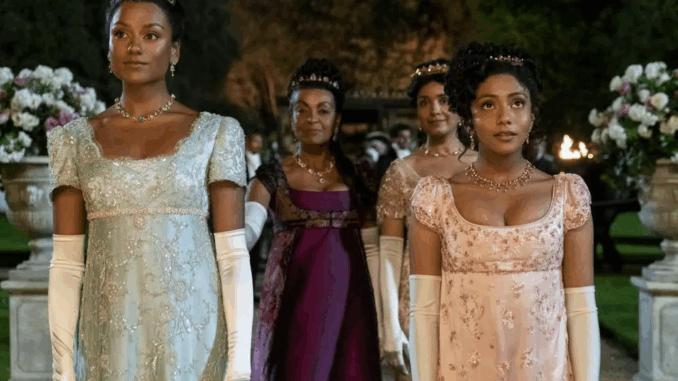
When I was a little girl, I buried myself in historical dramas. I devoured TV, movies, books — whatever could transport me from the anxious and lonely child I was into a different world where I could be adventurous, regal, glamorous, and loved. I would slip into the characters, imagining myself in the story. But all the characters — the queens, the princesses, and the peasants — were all white. Despite myself, I’d inevitably imagine myself as a white girl, leading to discomfiting dissociation. These were not my stories, those were not lives I could have ever lived in that era. So, how could I show up fully as myself, even in my own imagination?
As an adult, when I saw the meteoric popularity of Bridgerton, a Regency-era TV drama with color-blind casting, it intrigued me to see so many Black and brown women praise the escapism the show offered. Persuasion and Mr. Malcolm’s List are two other Regency dramas that have color-blind casting, and portray a partially-utopian Britain, where race has no bearing on one’s ability to move throughout society, or secure wealth and marriages. This rise in color-blind casting has been hailed as a sign of progress. But for me, I’m reminded of that old slippage the emptiness and confusion that comes with trying on another skin.
In Bridgerton’s world, racism does not exist. The show’s hasty explanation is that it was instantly eliminated by the marriage of the real-life Queen Charlotte who was rumored to have Black heritage — and King George III, who was reportedly opposed to slavery. Now, viewers are to assume that people who were slaves a decade ago are now sought-after dukes. In the world of Bridgerton, Black men marry white women, Asian men dance with Black women, white men marry Asian women — all seamlessly and without a whiff of racism or prejudice. For many, this is delightful and progressive. For others, it’s a confusing trend with disturbing potential consequences.
It makes sense, though, that Black and brown people would want to see ourselves in Regency-era romances. They are the stories that formed many of our first conceptions of love, mainly because of Jane Austen’s novels. Grusha Singh, who examined the Regency era in her postgraduate studies, tells Unbothered that Austen contributed to the heavy romanticization of the period. “Period dramas in general are romanticized, but Pride and Prejudice is nearly everyone’s favorite romance novel,” she says. “Enjoy the fantasy” is a popular response to people of color who push back against Bridgerton’s ahistorical world. But it’s not a fantasy. A world isn’t being invented from scratch. Bridgerton contains real historical events, real historical characters. The history that isn’t discussed is Britain’s brutality, which is not the same thing as fantasy. That is denial.